1. Right to Repair campaign makes it easier for consumers to fix their “stuff.”
 Whether it’s a new refrigerator in Minnesota, a new tractor in Colorado, a new television in California, an old Chromebook at a kids’ school, or a new iPhone anywhere in the country, many products will be easier to fix, and therefore keep, thanks to Right to Repair laws and policies championed by PIRG and our allies in 2023. This means less time and money wasted by consumers, less trash in our landfills, and more alternatives to our disposable culture. Whether it’s a new refrigerator in Minnesota, a new tractor in Colorado, a new television in California, an old Chromebook at a kids’ school, or a new iPhone anywhere in the country, many products will be easier to fix, and therefore keep, thanks to Right to Repair laws and policies championed by PIRG and our allies in 2023. This means less time and money wasted by consumers, less trash in our landfills, and more alternatives to our disposable culture.
Photo: PIRG’s Lucas Gutterman speaks in front of Google’s offices. Credit: Leise Jones Photography |
|
2. Renewables keep rising, and rising, and rising…
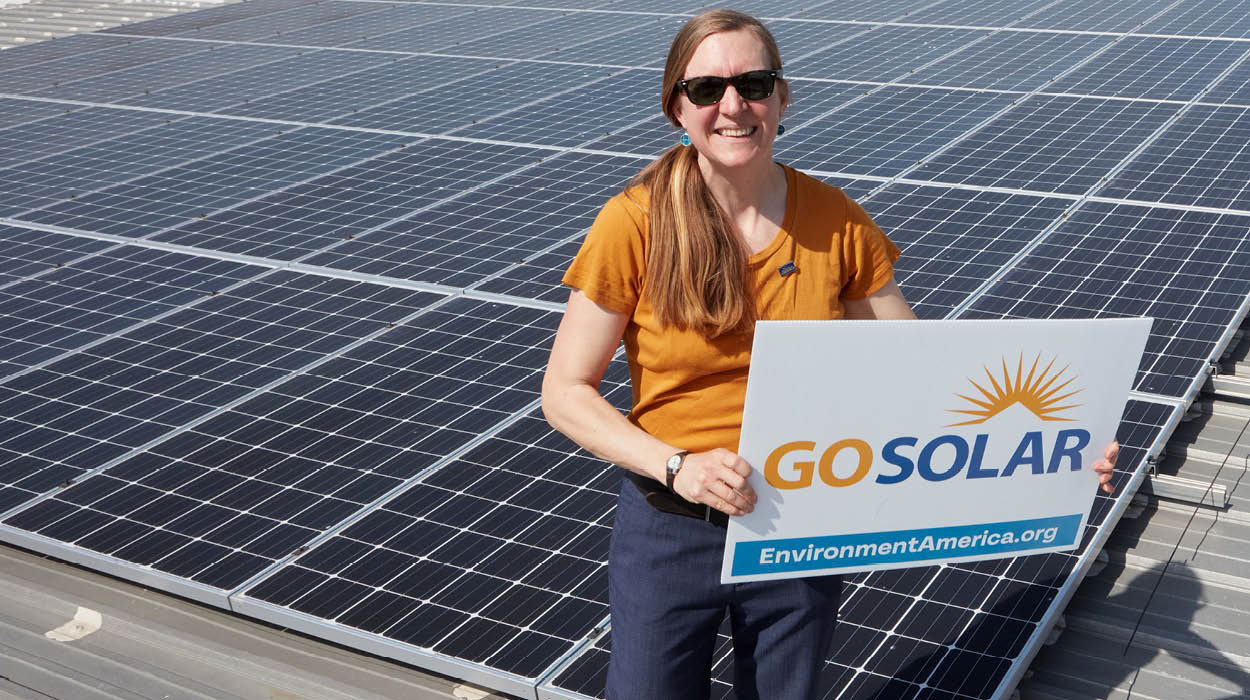
America is producing three times the amount of power from the sun, the wind and the Earth as the country did in 2013. Environment America’s latest Renewables on the Rise dashboard charts clean energy’s growth across an eclectic assortment of states – from blue California, to purple Nevada, to red Iowa. Our energy team is working to keep the clean energy trendlines pointing in the right direction by educating the public about new tax incentives to put solar on rooftops from warehouses to houses of worship.
Photo: Johanna Neumann, senior director of Environment America’s for 100% Renewable Energy, tours a warehouse rooftop with solar panels. Photo credit: Tim O’Connor. |
|
3. Costco, Amazon commit to cut plastic pollution.
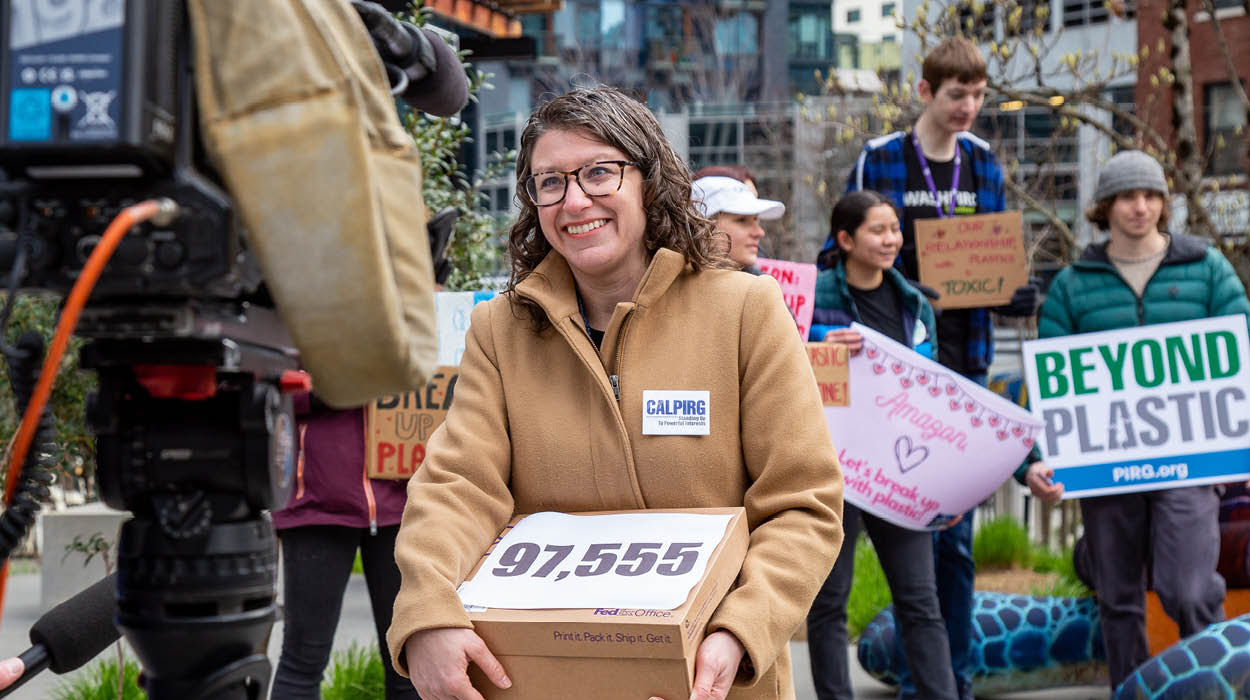
Costco is one of the largest retailers in the world. Amazon is America’s largest online retailer. Both companies made new commitments in 2023 to make a dent in plastic pollution after we mobilized shareholders and consumers. Amazon’s commitment also followed a CALPIRG investigation that tracked what happened when volunteers dropped off Amazon packages for recycling – tracing some of those packages all the way to the landfill.
Photo: CALPIRG State Director Jenn Engstrom helps deliver thousands of petition signatures from our members and supporters to Amazon headquarters in Seattle, urging the online retail giant to reduce its plastic packaging. Photo credit: Ricky Osborne. |
|
4. Winning for nature.
 Native bees will be less likely to encounter deadly pesticides thanks to new state laws spearheaded by Environment Colorado and Environment California. Together with many allies, we also secured new protections for the Boundary Waters (Minnesota), Bristol Bay (Alaska), Chaco Canyon (New Mexico) and the Grand Canyon region (Arizona). In November, voters approved an Environment Texas-backed $1 billion bond to fund the largest expansion of parks in the state’s history. And Environmental Action supporters voiced their opposition to a bill that would have erased endangered species protections for gray wolves nationwide. Native bees will be less likely to encounter deadly pesticides thanks to new state laws spearheaded by Environment Colorado and Environment California. Together with many allies, we also secured new protections for the Boundary Waters (Minnesota), Bristol Bay (Alaska), Chaco Canyon (New Mexico) and the Grand Canyon region (Arizona). In November, voters approved an Environment Texas-backed $1 billion bond to fund the largest expansion of parks in the state’s history. And Environmental Action supporters voiced their opposition to a bill that would have erased endangered species protections for gray wolves nationwide.
Photo: Staff join Gov. Jared Polis as he signs legislation making Colorado the ninth state to restrict neonics. Photo credit: Staff. |
|
5. Consumer Watchdog on patrol.
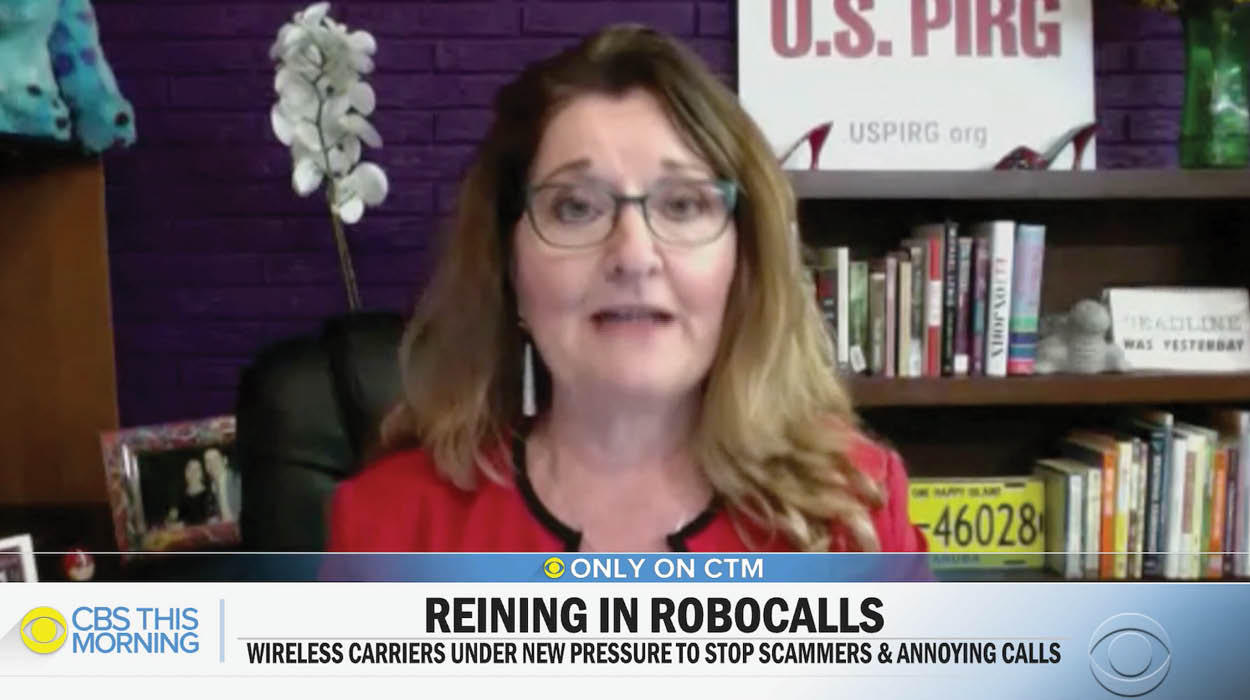
Consumers have access to more information than ever. Yet the flip side to the digital revolution includes new opportunities for fraud artists and unscrupulous companies to rip off consumers. PIRG’s Consumer Watchdog program alerted consumers to product recalls, ticket-selling scams, illegal robocalls and the theft of checks sent by U.S. mail, among other threats to consumer health, safety and well-being.
Photo: PIRG’s Teresa Murray alerts the public to consumer threats. Credit: CBS. |
|
6. Green Century° shareholder action changed corporate practices on the environment.
 Following Green Century’s actions during the 2022-2023 shareholder season, Apple announced a major reversal to its repair practices and policies; Costco agreed to shrink its greenhouse gas emissions; and Kraft-Heinz committed to changes in its supply chain to reduce tropical deforestation. These accomplishments are among the reasons that Green Century Funds President Leslie Samuelrich was named one of Barron’s 100 most influential women in U.S. finance. Following Green Century’s actions during the 2022-2023 shareholder season, Apple announced a major reversal to its repair practices and policies; Costco agreed to shrink its greenhouse gas emissions; and Kraft-Heinz committed to changes in its supply chain to reduce tropical deforestation. These accomplishments are among the reasons that Green Century Funds President Leslie Samuelrich was named one of Barron’s 100 most influential women in U.S. finance.
Photo: Green Century’s Leslie Samuelrich. Credit: Leise Jones Photography |
|
7. Lawsuits aim to hold U.S. Steel, other companies accountable for environmental violations.
 A sooty haze in Western Pennsylvania, toxic algae blooms in Lake Erie, countless bits of plastic floating in the Ohio River … These are the consequences of pollution emitted by U.S. Steel, Campbell Soup, and Styropek, respectively, in violation of federal environmental laws. National Environmental Law Center, our in-house litigation arm, is seeking to curb the pollution and hold the companies accountable through cases filed on behalf of PennEnvironment, Environment Ohio and other plaintiff organizations. A sooty haze in Western Pennsylvania, toxic algae blooms in Lake Erie, countless bits of plastic floating in the Ohio River … These are the consequences of pollution emitted by U.S. Steel, Campbell Soup, and Styropek, respectively, in violation of federal environmental laws. National Environmental Law Center, our in-house litigation arm, is seeking to curb the pollution and hold the companies accountable through cases filed on behalf of PennEnvironment, Environment Ohio and other plaintiff organizations.
Photo: PennEnvironment’s David Masur finds tiny plastic beads, known as nurdles, polluting the Ohio River from Styropek’s facility upstream. Credit: Garrick Schmitt |
|
8. Our researchers revealed which beaches were safe for swimming.
 Frontier Group, our in-house research arm, revealed that roughly half of U.S. beaches experienced at least one day in 2022 on which fecal contamination (which is exactly what you think it is) reached potentially unsafe levels. Our “Safe for Swimming?” report, co-authored with Environment America Research & Policy Center, named the beaches and tallied up the bad swimming days, earning media coverage on Fox and numerous other media outlets, while also pointing to the infrastructure investments that could make beaches cleaner. Frontier Group, our in-house research arm, revealed that roughly half of U.S. beaches experienced at least one day in 2022 on which fecal contamination (which is exactly what you think it is) reached potentially unsafe levels. Our “Safe for Swimming?” report, co-authored with Environment America Research & Policy Center, named the beaches and tallied up the bad swimming days, earning media coverage on Fox and numerous other media outlets, while also pointing to the infrastructure investments that could make beaches cleaner.
Photo: Environment America’s John Rumpler speaks to the media at the release of the “Safe for Swimming?” report. Credit: WGME. |
|
9. Something old, something new in citizen outreach.
 For more than 40 years, Fund for the Public Interest staff have been knocking on doors to drum up support for our issues. This year, the team combined improved targeting technology as well as old-school tactics, such as having actual human beings make phone calls to recruits, to help surpass our summer fundraising and membership goals. Meanwhile, our digital and web team rolled out new websites for PIRG, Environment America, Frontier Group and the network itself. Next up are Environmental Action and Community Action Works. For more than 40 years, Fund for the Public Interest staff have been knocking on doors to drum up support for our issues. This year, the team combined improved targeting technology as well as old-school tactics, such as having actual human beings make phone calls to recruits, to help surpass our summer fundraising and membership goals. Meanwhile, our digital and web team rolled out new websites for PIRG, Environment America, Frontier Group and the network itself. Next up are Environmental Action and Community Action Works.
Photo: Environment California canvassers get ready to knock on doors. Credit: Staff |
|
10. Action for a change on campus.
 Some college activists may opt for the inflammatory or sensational. But there’s still a strong desire on campuses to get involved in PIRG’s brand of principled yet pragmatic action on concrete problems that affect people’s daily lives – as evidenced by 16,000 students taking 74,000 actions at 213 campuses with our campus chapters and clubs. Some college activists may opt for the inflammatory or sensational. But there’s still a strong desire on campuses to get involved in PIRG’s brand of principled yet pragmatic action on concrete problems that affect people’s daily lives – as evidenced by 16,000 students taking 74,000 actions at 213 campuses with our campus chapters and clubs.
Photo: CALPIRG Students at a rally to protect our oceans. Credit: Andri Tambunan |
|
The Public Interest Network is not a registered investment adviser. The Public Interest Network is not providing any investment advice to any recipient of this communication.
°Green Century Capital Management, Inc. (Green Century) is the investment advisor to the Green Century Funds (the Funds). You should carefully consider the Fund’s investment objectives, risks, charges, and expenses before investing. To obtain a Prospectus that contains this and other information about the Funds please visit www.greencentury.com, email [email protected], or call 1-800-934-7336. Please read the Prospectus carefully before investing.
Investing involves risk and principal loss is possible. The Green Century Funds are distributed by UMB Distribution Services, LLC. 235 W Galena Street, Milwaukee, WI 53212.
Topics
Authors
Doug is President and Executive Director of The Public Interest Network. As director of MASSPIRG starting in 1979, he conceived and helped organize the Fund for the Public Interest, U.S. PIRG, National Environmental Law Center, Green Century Capital Management, Green Corps and Environment America, among other groups. Doug ran the public interest careers program at the Harvard Law School from 1976-1986. He is a graduate of Colorado State University and the Harvard Law School.
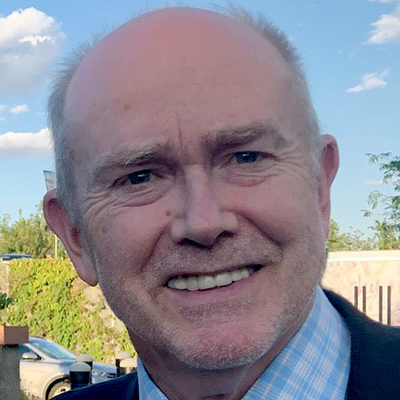

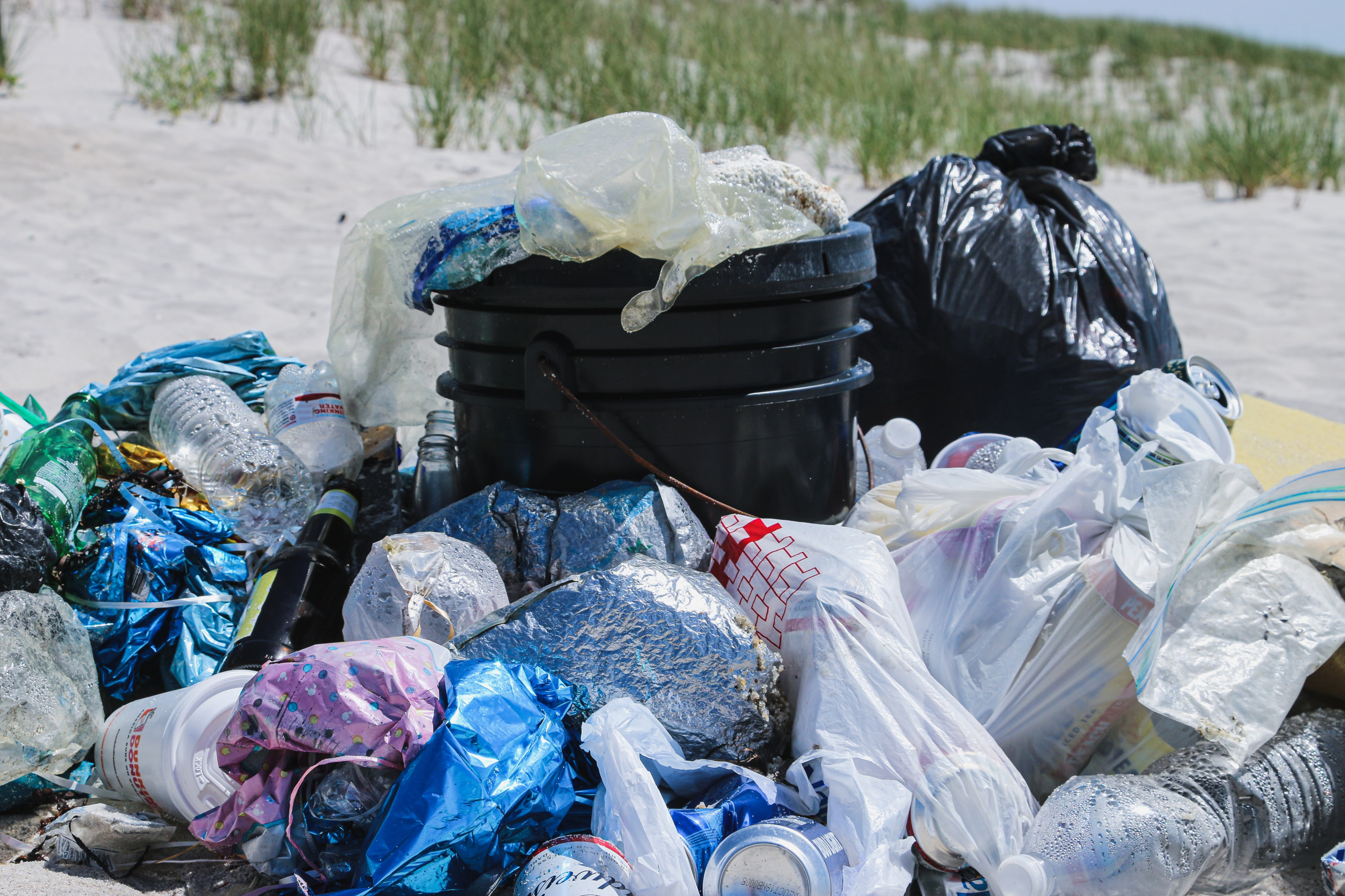
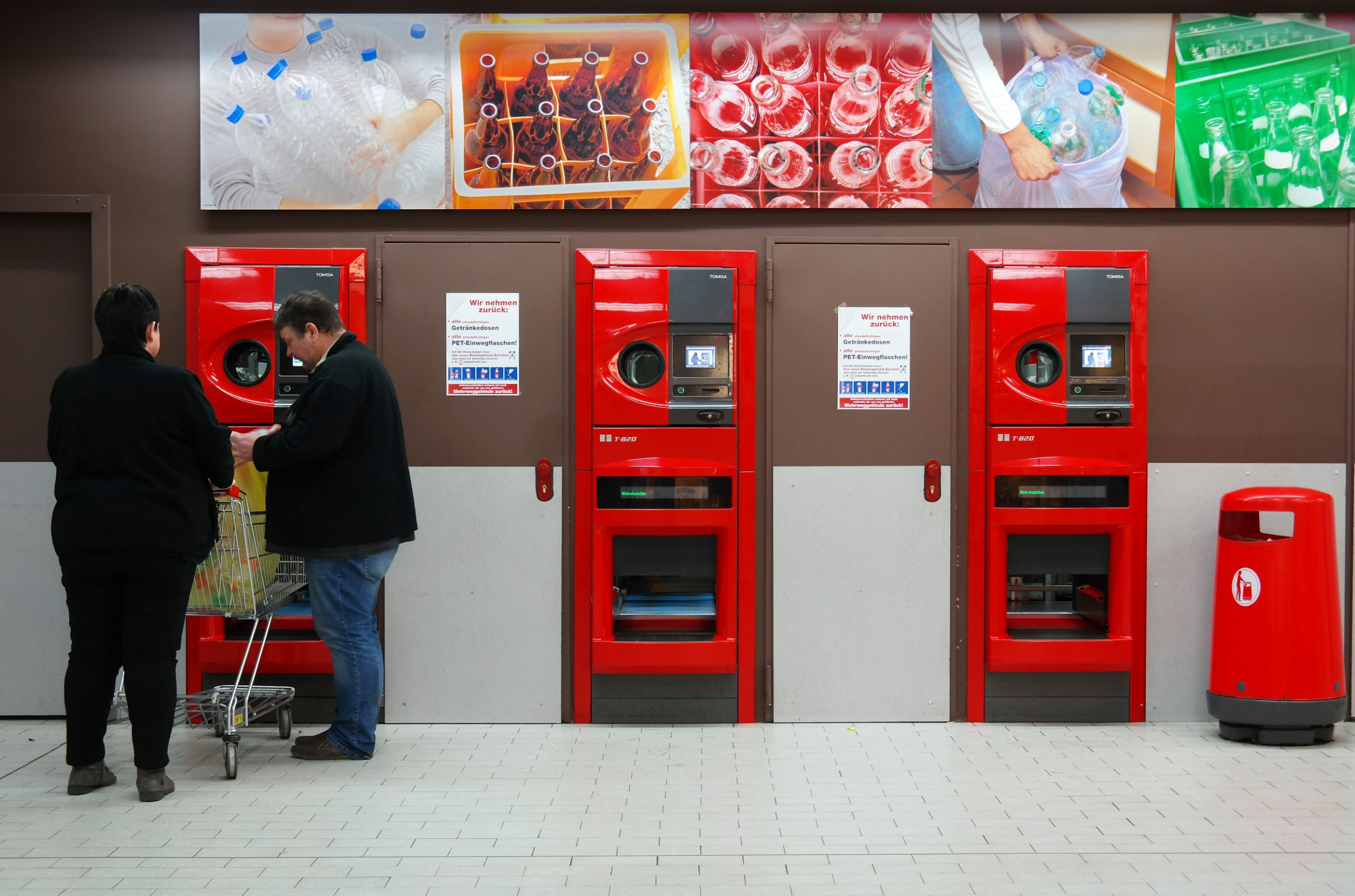

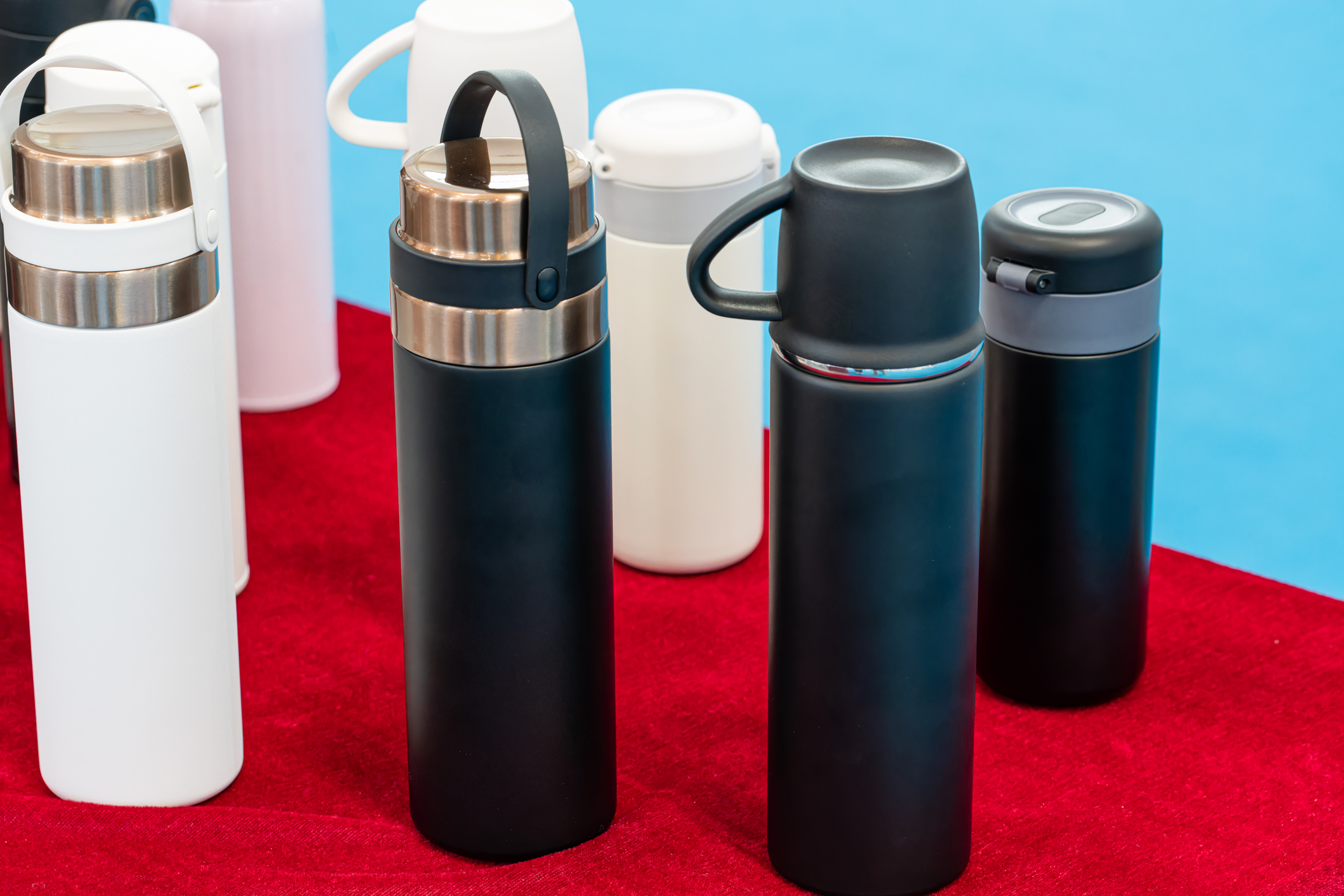

 Whether it’s a new refrigerator in Minnesota, a new tractor in Colorado, a new television in California, an old Chromebook at a kids’ school, or a new iPhone anywhere in the country, many products will be
Whether it’s a new refrigerator in Minnesota, a new tractor in Colorado, a new television in California, an old Chromebook at a kids’ school, or a new iPhone anywhere in the country, many products will be 

 Native bees will be less likely to encounter deadly pesticides thanks to new state laws spearheaded by Environment Colorado and Environment California. Together with many allies, we also secured new protections for the Boundary Waters (Minnesota), Bristol Bay (Alaska), Chaco Canyon (New Mexico) and the Grand Canyon region (Arizona). In November, voters approved an Environment Texas-backed $1 billion bond to fund the
Native bees will be less likely to encounter deadly pesticides thanks to new state laws spearheaded by Environment Colorado and Environment California. Together with many allies, we also secured new protections for the Boundary Waters (Minnesota), Bristol Bay (Alaska), Chaco Canyon (New Mexico) and the Grand Canyon region (Arizona). In November, voters approved an Environment Texas-backed $1 billion bond to fund the 
 Following Green Century’s actions during the 2022-2023 shareholder season, Apple announced a major reversal to its repair practices and policies; Costco agreed to shrink its greenhouse gas emissions; and Kraft-Heinz committed to changes in its supply chain to reduce tropical deforestation. These accomplishments are among the reasons that Green Century Funds President Leslie Samuelrich was
Following Green Century’s actions during the 2022-2023 shareholder season, Apple announced a major reversal to its repair practices and policies; Costco agreed to shrink its greenhouse gas emissions; and Kraft-Heinz committed to changes in its supply chain to reduce tropical deforestation. These accomplishments are among the reasons that Green Century Funds President Leslie Samuelrich was  A sooty haze in Western Pennsylvania, toxic algae blooms in Lake Erie, countless bits of plastic floating in the Ohio River … These are the consequences of pollution emitted by U.S. Steel, Campbell Soup, and Styropek, respectively, in violation of federal environmental laws.
A sooty haze in Western Pennsylvania, toxic algae blooms in Lake Erie, countless bits of plastic floating in the Ohio River … These are the consequences of pollution emitted by U.S. Steel, Campbell Soup, and Styropek, respectively, in violation of federal environmental laws.  Frontier Group, our in-house research arm, revealed that roughly half of U.S. beaches experienced at least one day in 2022 on which fecal contamination (which is exactly what you think it is) reached potentially unsafe levels. Our “
Frontier Group, our in-house research arm, revealed that roughly half of U.S. beaches experienced at least one day in 2022 on which fecal contamination (which is exactly what you think it is) reached potentially unsafe levels. Our “ For more than 40 years, Fund for the Public Interest staff have been knocking on doors to drum up support for our issues. This year, the team combined improved targeting technology as well as old-school tactics, such as having actual human beings make phone calls to recruits, to help surpass our summer fundraising and membership goals. Meanwhile, our digital and web team rolled out new websites for PIRG, Environment America, Frontier Group and the
For more than 40 years, Fund for the Public Interest staff have been knocking on doors to drum up support for our issues. This year, the team combined improved targeting technology as well as old-school tactics, such as having actual human beings make phone calls to recruits, to help surpass our summer fundraising and membership goals. Meanwhile, our digital and web team rolled out new websites for PIRG, Environment America, Frontier Group and the  Some college activists may opt for the inflammatory or sensational. But there’s still a strong desire on campuses to get involved in PIRG’s brand of principled yet pragmatic action on concrete problems that affect people’s daily lives – as evidenced by 16,000 students taking
Some college activists may opt for the inflammatory or sensational. But there’s still a strong desire on campuses to get involved in PIRG’s brand of principled yet pragmatic action on concrete problems that affect people’s daily lives – as evidenced by 16,000 students taking